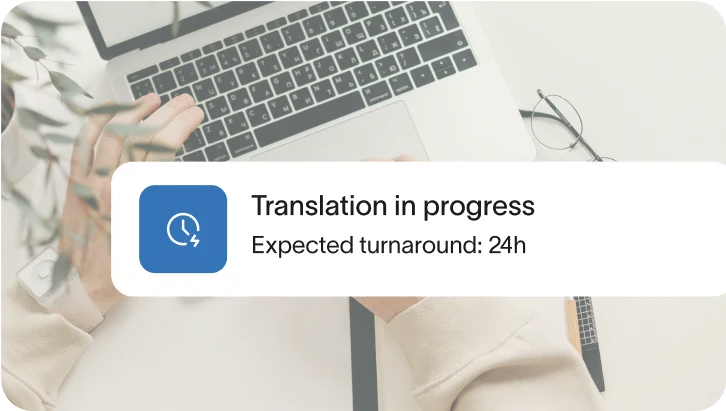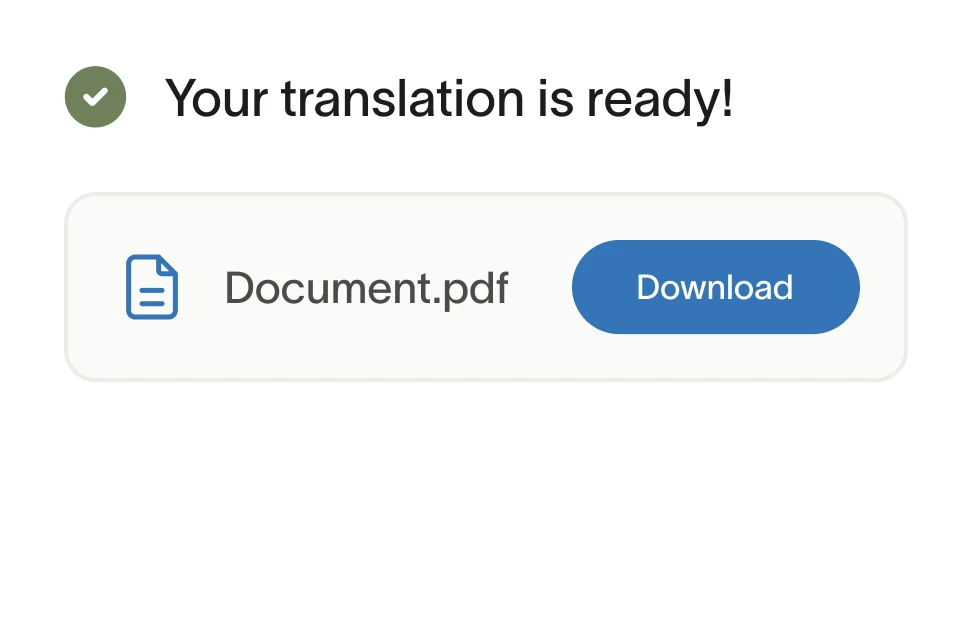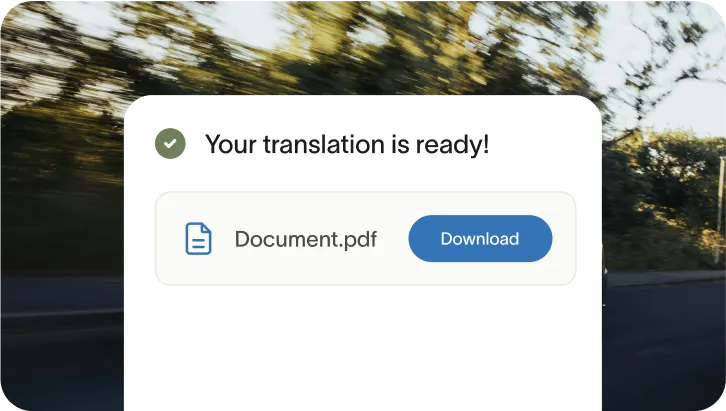Certified translation services
Get your documents translated and certified by a professional translator in 65+ languages for just $24.95 per page. Our high-quality translations are delivered within 24 hours, ensuring a fast and hassle-free process.
Get your documents translated and certified by a professional translator in 65+ languages for just $24.95 per page. Our high-quality translations are delivered within 24 hours, ensuring a fast and hassle-free process.

RushTranslate is one of the leading providers of certified translations in the United States. Trusted by tens of thousands of businesses and individuals each year, we deliver high-quality, affordable translations with unmatched reliability.
Each member of our translation team is a full-time professional translator thoroughly vetted and regularly reviewed to ensure we maintain consistent quality across languages.
See all languagesGet your translations fast with our efficient workflows and real-time order updates, keeping you informed every step of the way.
Trusted by 240,000+ customers, our certified translations meet the highest standards, with secure handling of your documents at every step.
Our translators bring a wide range of industry and document specific experience. We'll match your project with the ideal translator to ensure accuracy and quality.
Browse common documentsOur certified translations are accepted by USCIS, universities, government agencies, and businesses worldwide. No matter your needs, we provide reliable, fast, and secure translations to ensure a seamless process.
Explore popular use casesYour certified translation will be delivered as a digital PDF with a signed and stamped certificate of translation accuracy. We apply basic formatting to enhance readability, but don't replicate the design of your source document.
Included in the certification statement:
We take pride in delivering consistent, high-quality service. With 4.8 stars from 23,771 reviews on Google, BBB, and our site, you can rely on us for your translation needs.
Our streamlined process makes it easy to get your documents translated quickly and efficiently.
Select your language pair, upload your documents, and add any optional services to quickly get your translation process started.



A professional translator will carefully translate your document. You'll have the opportunity to review it and request edits before it is finalized.



You'll receive the final translated documents, along with a signed and stamped certification on our company letterhead if certification is selected.



Get answers to common questions about our certified translation services. Learn what a certified translation is, how our process works, pricing details, turnaround times, notarization and apostille options, and how to receive your completed translation.
A certified translation is an exact, word-for-word translation of the original document, accompanied by a signed statement from the translator or translation agency confirming its accuracy and completeness. This statement also verifies the translator's fluency in both languages. Certified translations are commonly required for official purposes, including immigration, legal proceedings, court submissions, and academic applications.
Our translation process is simple and efficient, but understanding the steps in advance can be helpful. Here's a quick overview: upload your documents and place your order, we assign the best translator for your project, and you'll be notified when your translation is complete. If revisions are needed, you can request them. For a detailed breakdown, we recommend reviewing our Translation Process Guide before placing an order.
Certified translations are $24.95 per page, with a page defined as 250 words or less. Additional services, such as proofreading and expedited turnaround, are available for an extra fee. For full details, visit our pricing page or get a quote to calculate your project cost.
Most 1-3 page documents (up to 750 words) are delivered digitally within 24 hours. For a precise estimate, request a quote. Our translations are completed by professional human translators, and turnaround times vary based on factors such as word count, language pair, translator availability, and document complexity. Expedited turnaround is available, reducing the standard time by approximately 50%. Learn more about translation turnaround times.
Our translations are generally accepted by governments, courts, universities, and other institutions worldwide. However, it is your responsibility to confirm that our translation meets the specific requirements of the receiving office. If you're unsure, contact us with their requirements, and we'll review them with you. For certain common recipients where requirements are well-defined, we offer an acceptance guarantee.
We offer notarization as an optional add-on for all certified translations at $19.95 per order. Each Certificate of Translation Accuracy in your order will be notarized by a representative of our company and a Kentucky Notary Public, including their signature, commission number, expiration date, and an official rubber ink stamp. This notarization is valid in all 50 states.
Notarizations are processed in batches twice daily, Monday through Friday. Once your translation is approved, it will be notarized in the next available batch.
Additionally, we offer an apostille service for notarizations that need to be recognized internationally by member countries of the Hague Convention for an additional $79.95 per order.
Learn more about notarization for certified translations.
We'll notify you via email when your documents are translated and ready for your review. You can always access your order details, retrieve translated files, and request revisions from your order status page.